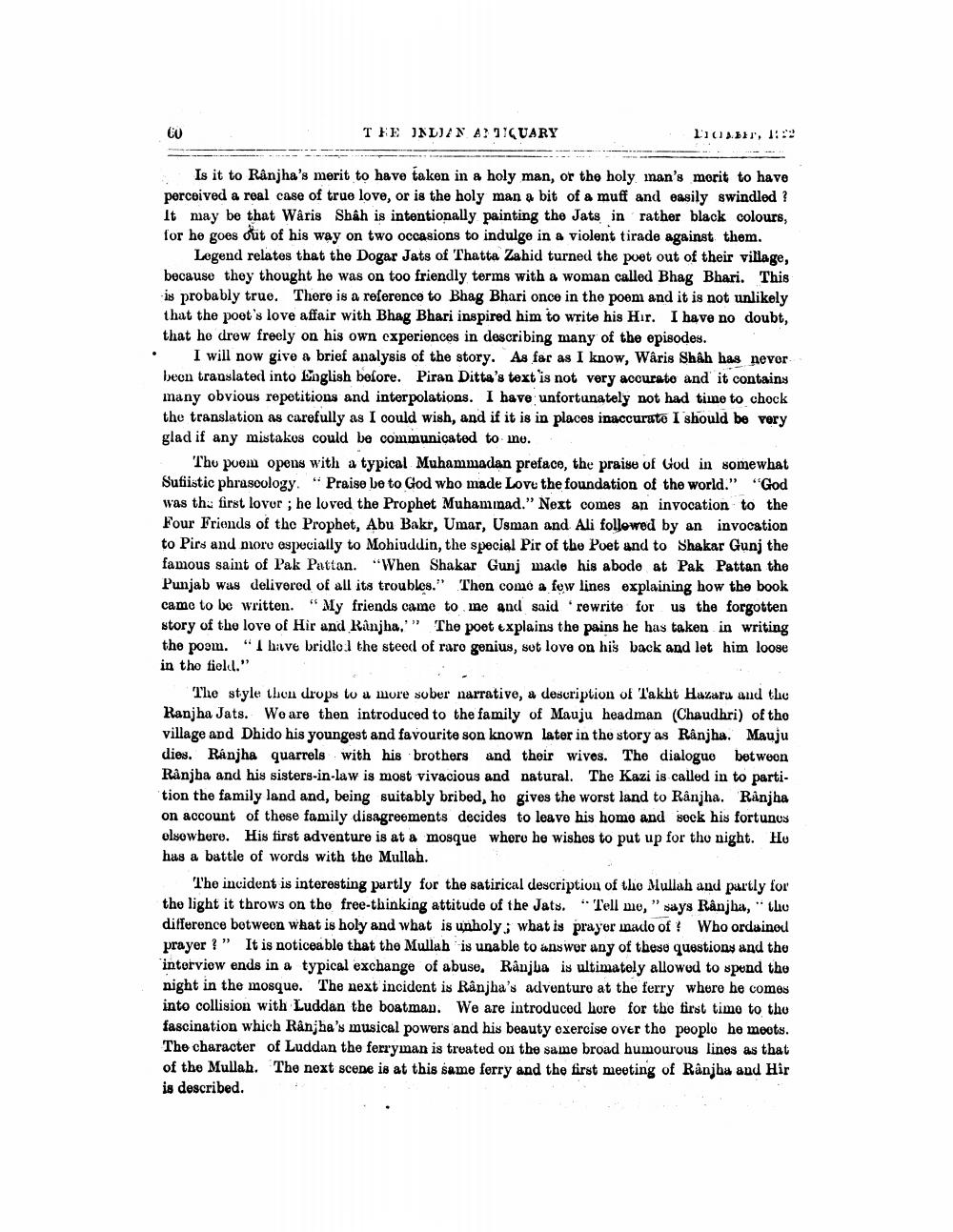________________
THE INLIAN A? 7/(UARY
11(BT', 1:2
Is it to Ranjha's merit to have taken in a holy man, or the holy inan's morit to have perceived a real case of true love, or is the holy man a bit of a muff and easily swindled ? It may be that Waris Shah is intentionally painting the Jats in rather black colours, for he goes out of his way on two occasions to indulge in a violent tirade against them.
Logend relates that the Dogar Jats of Thatta Zahid turned the poet out of their village, because thoy thought he was on too friendly terms with a woman callod Bhag Bhari. This is probably true. There is a reference to Bhag Bhari once in the poem and it is not unlikely that the poet's love affair with Bhag Bhari inspired him to write his Hır. I have no doubt, that ho drew freely on his own experiences in describing many of the episodes. • I will now give a brief analysis of the story. As far as I know, Waris Shah has never
been translated into English before. Piran Ditta's text is not very accurate and it contains many obvious repetitions and interpolations. I have unfortunately not had time to chock the translation as carefully as I could wish, and if it is in places inaccurate I should be very glad if any mistakos could be communicated to mo.
Thu poem opens with a typical Muhammadan preface, the praise of God in somewhat Sufiistic phrasoology. "Praise be to God who made Love the foundation of the world." "God was th: first lovor; he loved the Prophet Muhammad." Next comes an invocation to the Four Friends of the Prophet, Abu Bakr, Umar, Usman and Ali followed by an invocation to Pirs and more especially to Mohiuddin, the special Pir of the Poet and to Shakar Gunj the famous saint of Pak Pattan. "When Shakar Gunj made his abodo at Pak Pattan the Punjab was delivered of all its troubles." Thon como a few lines explaining how the book came to be written. "My friends came to me and said rewrito for us the forgotten story of the love of Hir and Ranjha.'” The poet explains the pains he has taken in writing the poom." I have bridlo:1 the steed of raro genius, sot love on his back and let him loose in the fioll."
The style thon drops to a more suber narrative, a description of Takht Hazaru and the Ranjha Jats. We are then introduced to the family of Mauju headman (Chaudhri) of the village and Dhido his youngest and favourite son known later in the story as Ranjha. Mauju dies. Ranjha quarrels with his brothers and their wives. The dialogue between Ranjba and his sisters-in-law is most vivacious and natural. The Kazi is called in to partition the family land and, being suitably bribed, he gives the worst land to Ranjha. Ranjha on account of these family disagreements decides to leave his home and seck his fortunos olsowbere. His first adventure is at a mosque where he wishes to put up for the night. Hu has a battle of words with the Mullah.
The incident is interesting partly for the satirical description of tho Mullah and partly for the light it throws on tho free-thinking attitude of the Jats. "Tell me," says Ranjha, thu difference between what is holy and what is unholy; what is prayer made of? Who ordainou prayer?" It is noticeable that the Mullah is unable to answer any of these questions and the interview ends in a typical exchange of abuse, Ranjba is ultimately allowed to spend the night in the mosque. The next incident is Ranjha's adventure at the ferry where he comes into collision with Luddan the boatman. We are introduced bore for the first time to the fascination which Ranjha's musical powers and his beauty exercise over tho peoplo he meets. The character of Luddan the ferryman is treated on the same broad humourous lines as that of the Mullah. The next scene is at this same ferry and the first meeting of Ranjha and Hir is described.




